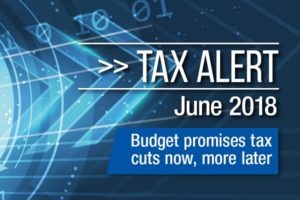While the May 2018 Budget delivered modest personal tax concessions for the upcoming financial year to Australian taxpayers, the big news was a new long-term tax plan that will overturn the existing progressive tax system.

Here’s a roundup of the latest tax news:
Tax offsets for lower income earners
The headline announcement in the Federal Budget was immediate tax relief from 1 July 2018 for those earning up to $90,000. This low and middle income tax offset will provide relief of up to $530 a year. However, the tax cut will not affect weekly pay packets as it comes in the form of a tax offset, meaning taxpayers will not see any extra money in their hands until after tax time next year.
Another significant change from 1 July 2018 will be a lift in the threshold at which the 37 per cent tax rate applies, rising from $87,000 to $90,001. This means that those earning between $37,001 and $90,000 will be taxed at a rate of 32.5 per cent.
The Government also announced a 7-year plan to reduce the number of tax brackets to four by eliminating the 37 per cent tax bracket in 2024-25. This represents a major change to the current progressive tax system, as 94 per cent of workers (those earning between $41,001 and $200,000), would then be paying a flat tax rate of 32.5 per cent.
Instant asset write-off survives
The popular $20,000 instant asset write-off lives on, with the Government announcing another one-year extension in this year’s Budget. Small businesses with turnover under $10 million will still be able to claim an immediate tax deduction for capital equipment purchases until 30 June 2019.
GST reporting will also be further streamlined, with the number of GST questions on quarterly Business Activity Statements reduced to three.
Greater emphasis on compliance
The Budget also included a tougher approach to tax debts, greater emphasis on compliance and a renewed focus on tackling the ‘black economy’.
Provisions in this area include closer scrutiny of trusts, including application of Division 7A, circular distributions and testamentary trusts, and assignments by partners in professional practices. Research and development (R&D) incentive claims by businesses are also to be tightened.
New ‘land banking’ tax
A little-noticed Budget announcement will see owners of vacant land disallowed from claiming deductions (such as interest costs) associated with holding the land. The change is designed to reduce the incentive for ‘land banking’, which prevents the land being used for housing or other development. The new measure will apply from 1 July 2019.
GST on low-value imported goods
From 1 July 2018, GST will apply to offshore goods valued at $1,000 or less purchased by consumers and imported into Australia. The new regime applies to all businesses registered for GST, including where the business delivers or facilitates delivery of the goods into Australia.
To assist with implementation, the ATO has released a new ruling covering GST registration for suppliers. Existing rules on imports valued over $1,000 remain unchanged and business-to-business sales are excluded.
Greater scrutiny of car claims
Taxpayer claims for work-related car expenses will be coming in for close attention this tax time as part of a broader focus on work-related expenses.
According to the ATO, it sees numerous mistakes in taxpayer claims in this area, including claims for private trips, trips not actually made and for car expenses paid for or already reimbursed by an employer.
Taxpayers claiming the maximum amount under the cents-per-kilometre method are likely to face particular scrutiny, as the tax man believes many people mistakenly believe there is a ‘standard’ 5,000 kilometre deduction they are entitled to claim for work-related car expenses. However, taxpayers can only claim for kilometres they actually travel and must be able to provide evidence of having travelled that distance if required.
Did you enjoy this article?
Click below to share it
More News Articles

Get your SMSF ready for 30 June
The rules around SMSFs are strict and if you don’t do things the right way, your fund could end up paying extra tax

Tax Alert June 2022
With attempted GST fraud on the rise and certain family trust payments under a cloud, the tax regulator is stepping up scrutiny of more transactions

Combine Your Super into One Account to Save
Before you change out of a super fund, there are few things you need to do

Federal Budget 2022-23 Analysis
A balancing act Billed as a Budget for families with a focus on relieving short-term cost of living

Avoid the Rush: Get Ready for June 30
Starting early is essential if you want to make the most of the opportunities on offer when it comes to your super and tax affairs
Subscribe to Our Mailing List & Connect Through our Socials
While you may have come to us from a variety of sources, the time has never been better to join us.
Subscribe to our mailing list and connect through out socials to keep up to date with our latest news and get some tips.





